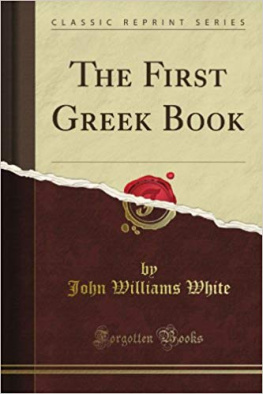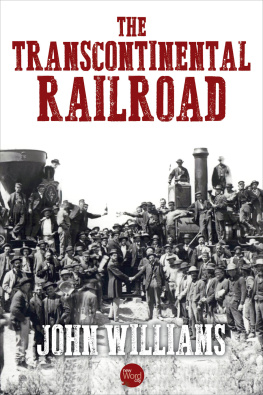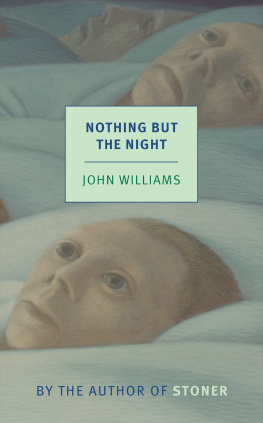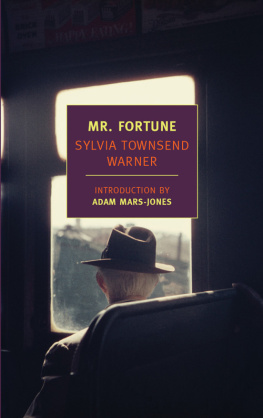John Williams - Butchers Crossing (New York Review Books Classics)
Here you can read online John Williams - Butchers Crossing (New York Review Books Classics) full text of the book (entire story) in english for free. Download pdf and epub, get meaning, cover and reviews about this ebook. year: 2011, publisher: NYRB Classics, genre: Detective and thriller. Description of the work, (preface) as well as reviews are available. Best literature library LitArk.com created for fans of good reading and offers a wide selection of genres:
Romance novel
Science fiction
Adventure
Detective
Science
History
Home and family
Prose
Art
Politics
Computer
Non-fiction
Religion
Business
Children
Humor
Choose a favorite category and find really read worthwhile books. Enjoy immersion in the world of imagination, feel the emotions of the characters or learn something new for yourself, make an fascinating discovery.

- Book:Butchers Crossing (New York Review Books Classics)
- Author:
- Publisher:NYRB Classics
- Genre:
- Year:2011
- Rating:3 / 5
- Favourites:Add to favourites
- Your mark:
- 60
- 1
- 2
- 3
- 4
- 5
Butchers Crossing (New York Review Books Classics): summary, description and annotation
We offer to read an annotation, description, summary or preface (depends on what the author of the book "Butchers Crossing (New York Review Books Classics)" wrote himself). If you haven't found the necessary information about the book — write in the comments, we will try to find it.
Butchers Crossing (New York Review Books Classics) — read online for free the complete book (whole text) full work
Below is the text of the book, divided by pages. System saving the place of the last page read, allows you to conveniently read the book "Butchers Crossing (New York Review Books Classics)" online for free, without having to search again every time where you left off. Put a bookmark, and you can go to the page where you finished reading at any time.
Font size:
Interval:
Bookmark:
NEW YORK REVIEW BOOKS
CLASSICS
JOHN WILLIAMS (19221994) was born and raised in northeast Texas. Despite a talent for writing and acting, Williams flunked out of a local junior college after his first year. He reluctantly joined the war effort, enlisting in the Army Air Corps, and managing to write a draft of his first novel while there. Once home, Williams found a small publisher for the novel and enrolled at the University of Denver, where he was eventually to receive both his B.A. and M.A., and where he was to return as an instructor in 1954. Williams was to remain on the staff of the writing program at the University of Denver until his retirement in 1985. During these years, he was an active guest lecturer and writer, publishing two volumes of poetry and three novels, Butchers Crossing, Stoner (also published by NYRB Classics), and the National Book Awardwinning Augustus.
MICHELLE LATIOLAIS is a member of the Programs in Writing at the University of California at Irvine where she is associate professor of English. She is the author of the novel Even Now.
The coach from Ellsworth to Butchers Crossing was a dougherty that had been converted to carry passengers and small freight. Four mules pulled the cart over the ridged, uneven road that descended slightly from the level prairie into Butchers Crossing; as the small wheels of the dougherty entered and left the ruts made by heavier wagons, the canvas-covered load lashed in the center of the cart shifted, the rolled-up canvas side curtains thumped against the hickory rods that supported the lath and canvas roof, and the single passenger at the rear of the wagon braced himself by wedging his body against the narrow sideboard; one hand was spread flat against the hard leather-covered bench and the other grasped one of the smooth hickory poles set in iron sockets attached to the sideboards. The driver, separated from his passenger by the freight that had been piled nearly as high as the roof, shouted above the snorting of the mules and the creaking of the wagon:
Butchers Crossing, just ahead.
The passenger nodded and leaned his head and shoulders out over the side of the wagon. Beyond the sweating rumps and bobbing ears of the mules he caught a glimpse of a few bare shacks and tents set in a cluster before a taller patch of trees. He had an instantaneous impression of colorof light dun blending into gray set off by a heavy splash of green. Then the bouncing of the wagon forced him to sit upright again. He gazed at the swaying mound of goods in front of him, blinking rapidly. He was a man in his early twenties, slightly built, with a fair skin that was beginning to redden after the days exposure to the sun. He had removed his hat to wipe the sweat from his forehead and had not replaced it; his light brown hair, the color of Virginia tobacco, was neatly clipped, but it lay now in damp unevenly colored ringlets about his ears and forehead. He wore yellowish-brown nankeen trousers that were nearly new, the creases still faintly visible in the heavy cloth. He had earlier removed his brown sack coat, his vest, and his tie; but even in the breeze made by the doughertys slow forward progress, his white linen shirt was spotted with sweat and hung limply on him. The blond nap of a two-day-old beard glistened with moisture; occasionally he rubbed his face with a soiled handkerchief, as if the stubble irritated his skin.
As they neared town, the road leveled and the wagon went forward more rapidly, swaying gently from side to side, so that the young man was able to relax his grasp on the hickory pole and slump forward more easily on the hard bench. The clop of the mules feet became steady and muffled; a cloud of dust like yellow smoke rose about the wagon and billowed behind it. Above the rattle of harness, the mules heavy breathing, the clop of their hooves, and the uneven creaking of the wagon could be heard now and then the distant shout of a human voice and the nickering of a horse. Along the side of the road bare patches appeared in the long level of prairie grass; here and there the charred, crossed logs of an abandoned campfire were visible; a few hobbled horses grazed on the short yellow grass and raised their heads sharply, their ears pitched forward, at the sound of the wagon passing. A voice rose in anger; someone laughed; a horse snorted and neighed, and a bridle jingled at a sudden movement; the faint odor of manure was locked in the hot air.
Butchers Crossing could be taken in almost at a glance. A group of six rough frame buildings was bisected by a narrow dirt street; there was a scattering of tents beyond the buildings on either side. The wagon passed first on its left a loosely erected tent of army drab with rolled-up sides, which held from the roof flap a flat board crudely lettered in red, J OE L ONG , B ARBAR . On the opposite side of the road was a low building, almost square, windowless, with a flap of canvas for a door; across the bare front boards of this building were the more carefully executed letters, in black, B RADLEY D RY G OODS . In front of the next building, a long rectangular structure of two stories, the dougherty stopped. From within this building came a low, continuous murmur of voices, and there could be heard the regular clink of glass on glass. The front was shaded by a long overhang of roof, but there was discernible in the shadow over the entrance-way an ornately lettered sign, in red with black edging, which said: J ACKSONS S ALOON . Upon a long bench in front of this place sat several men lethargically staring at the wagon as it came to a halt. The young passenger began to gather from the seat beside him the clothing he had doffed earlier in the heat of the day. He put on his hat and his coat and stuffed the vest and cravat into a carpetbag upon which he had been resting his feet. He lifted the carpetbag over the sideboard into the street and with the same motion lifted a leg over the boards and stepped onto the hanging iron plate that let him descend to the ground. When his boot struck the earth, a round puff of dust flew up, surrounding his foot; it settled on the new black leather and on the bottom of his trouser leg, making their colors nearly the same. He picked up his bag and walked under the projecting roof into the shade; behind him the drivers curses mingled with the clank of iron and the jingling of harness chain as he detached the rear doubletree from the wagon. The driver called plaintively:
Some of you men give me a hand with this freight.
The young man who had got off the wagon stood on the rough board sidewalk watching the driver struggle with the reins that had tangled with the harness trace. Two of the men who had been sitting on the bench got up, brushed past him, and went slowly into the street; they contemplated the rope that secured the freight and began unhurriedly to tug at the knots. With a final jerk the driver managed to unsnarl the reins; he led the mules in a long diagonal across the street toward the livery stable, a low open building with a split-log roof supported by unpeeled upright logs.
After the driver led his team into the stable, another stillness came upon the street. The two men were methodically loosening the ropes that held the covered freight; the sounds from inside the saloon were muffled as if by layers of dust and heat. The young man stepped forward carefully upon the odd lengths of scrap board set directly on the earth. Facing him was a half-dugout with a sharply slanting roof at the near edge of which was a hinged covering, held upright by two diagonal poles, which let down to cover the wide front opening; inside the dugout, on benches and shelves, were scattered a few saddles and a half dozen or more pairs of boots; long strips of raw leather hung from a peg that jutted out of the sod wall near the opening. To the left of this small dugout was a double-storied structure, newly painted white with red trimmings, nearly as long as Jacksons Saloon and somewhat higher. In the dead center of this building was a wide door, above which was a neatly framed sign that read B UTCHERS H OTEL . It was toward this that the young man slowly walked, watching the street dust pushed forward in quick, dissipating jets by his moving feet.
Font size:
Interval:
Bookmark:
Similar books «Butchers Crossing (New York Review Books Classics)»
Look at similar books to Butchers Crossing (New York Review Books Classics). We have selected literature similar in name and meaning in the hope of providing readers with more options to find new, interesting, not yet read works.
Discussion, reviews of the book Butchers Crossing (New York Review Books Classics) and just readers' own opinions. Leave your comments, write what you think about the work, its meaning or the main characters. Specify what exactly you liked and what you didn't like, and why you think so.








